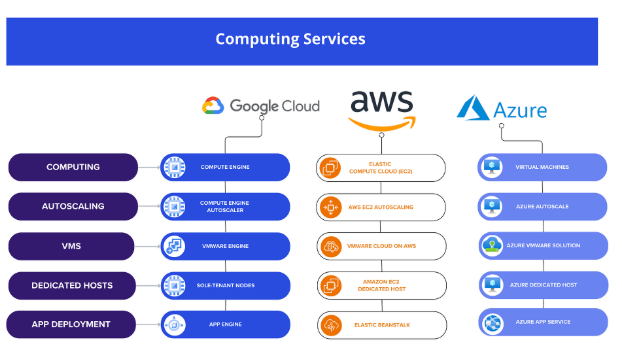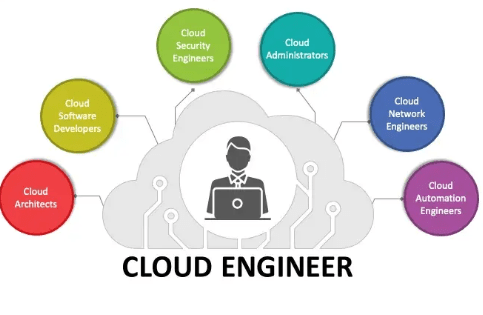
- Introduction to Cloud Engineering
- Key Responsibilities of a Cloud Engineer
- Cloud Service Providers: AWS, Azure, GCP
- Learning Resources for Cloud Engineers
- Cloud Engineer Certifications and Their Importance
- Required Skills for Cloud Engineers
- Entry-Level vs Senior Cloud Engineer Roles
- Cloud Engineer Salary Trends
- Job Opportunities and Career Growth
- Real-World Cloud Implementation Examples
- Challenges in Cloud Engineering
- Conclusion
Introduction to Cloud Engineering
Cloud engineering is a rapidly growing field in technology that focuses on designing, building, and maintaining cloud computing systems and infrastructure. As businesses increasingly migrate their operations and services to the cloud, cloud engineers are in high demand to ensure that these systems are scalable, reliable, secure, and cost-efficient. Cloud Computing Training work with cloud platforms such as Amazon Web Services (AWS), Microsoft Azure, and Google Cloud Platform (GCP) to design solutions that meet the needs of businesses and organizations in various industries. Cloud engineering encompasses various roles, including architecture, development, operations, and security, all of which focus on optimizing cloud resources. These professionals must have a deep understanding of cloud computing technologies and the ability to troubleshoot, optimize, and ensure the availability and security of cloud systems.
Key Responsibilities of a Cloud Engineer
Cloud engineers are responsible for a wide range of tasks depending on their specific role (e.g., cloud architect, cloud security engineer, cloud systems engineer). However, some everyday responsibilities include:
- Cloud Infrastructure Design and Implementation: Cloud engineers design, implement, and manage cloud infrastructure to meet business needs. This involves setting up services like virtual machines, cloud storage, load balancers, and other resources.
- Automation and Deployment: Introduction To Cloud Computing develop automation scripts and use tools like Terraform, AWS CloudFormation, or Azure Resource Manager (ARM) templates to automate resource provisioning, ensuring repeatability and efficiency in deployments.
- Monitoring and Optimization: Cloud engineers continuously monitor cloud systems for performance, availability, and security. They use tools like AWS CloudWatch, Azure Monitor, and Google Stackdriver to optimize cloud resources for cost and performance.
- Security and Compliance: Ensuring cloud infrastructure security is a critical responsibility. Cloud engineers configure firewalls, identity and access management (IAM), encryption, and other security features to safeguard data and applications in the cloud.
- Troubleshooting and Support: When cloud services experience issues, cloud engineers are responsible for troubleshooting and resolving the problems. They often work with development and operations teams to identify and fix problems.
- Collaboration with Other Teams: Cloud engineers collaborate with software developers, system administrators, and IT teams to ensure seamless integration and deployment of cloud services across the organization.
To Earn Your Cloud Computing Course Certification, Gain Insights From Leading Cloud Computing Experts And Advance Your Career With ACTE’s Cloud Computing Course Today!
Cloud Service Providers: AWS, Azure, GCP
Cloud engineers work with various cloud platforms, each providing different services and features. Cloud engineers typically specialize in one or more of these platforms, depending on their organization’s or client’s needs. However, many engineers expand their expertise to cover multiple platforms, enabling them to build multi-cloud solutions. The three leading cloud service providers are:
- Amazon Web Services (AWS): Amazon Web Services is the largest and most widely used cloud platform. Unlocking Scalability with Cloud Native Tech offers various services, including computing power, storage, databases, networking, and machine learning. AWS provides tools for managing large-scale cloud environments and integrating multiple systems. As a cloud engineer, expertise in AWS is highly sought after, mainly due to its vast global infrastructure and extensive documentation.
- Microsoft Azure: Azure is another major player in the cloud computing market. It provides solutions that integrate well with Microsoft Azure products and services, making it popular among businesses that use Windows-based systems and software. Azure has a strong presence in hybrid cloud solutions, offering services such as Azure Stack and Azure Site Recovery.
- Google Cloud Platform (GCP): GCP is known for its strong data analytics and machine learning offerings. It is widely used for big data and AI workloads. Google Cloud Platform is ideal for businesses that focus on analytics, machine learning, and data processing, and its Kubernetes Engine is one of the most popular services for containerized applications.

Learning Resources for Cloud Engineers
Aspiring cloud engineers can leverage a variety of learning resources to build their skills and expertise. Cloud provider documentation from Amazon Web Services , Azure, and Google Cloud Platform is an invaluable resource, offering detailed guides on services and best practices. Seamless Cloud Migration Guide , online courses from platforms like Udemy, Coursera, and Pluralsight provide structured learning paths, often tailored to cloud certifications and technical skills. Cloud providers themselves, such as AWS, Microsoft Azure, and Google Cloud, offer training and certification programs specifically designed for cloud engineers. Books like Cloud Native DevOps with Kubernetes and AWS Certified Solutions Architect Associate Guide are also excellent resources for those looking to deepen their knowledge. Engaging with online communities and forums, including Stack Overflow, Reddit, and cloud-specific spaces, allows aspiring cloud engineers to exchange ideas, troubleshoot issues, and stay updated on industry trends.
Would You Like to Know More About Cloud Computing Course? Sign Up For Our Cloud Computing Course Now!
Cloud Engineer Certifications and Their Importance
Certifications are crucial in Cloud Computing Training, as they demonstrate technical proficiency and knowledge of cloud technologies. Obtaining certifications from major cloud service providers enhances an engineer’s credibility, making them more attractive to potential employers. Here are some of the top certifications for cloud engineers:
- AWS Certified Solutions Architect – Associate: This certification is designed for cloud engineers who want to demonstrate their ability to create and deploy scalable, highly available, and fault-tolerant systems on Amazon Web Services.
- Microsoft Certified: Azure Solutions Architect Expert: This certification validates expertise in designing cloud solutions using Microsoft Azure. It covers aspects like networking, security, and governance.
- Google Professional Cloud Architect: This certification is for engineers who want to prove their skills in designing, developing, and managing scalable and secure cloud infrastructures on Google Cloud.
- Certified Kubernetes Administrator (CKA): Kubernetes is a container orchestration platform widely used in cloud environments. This certification validates the ability to manage Kubernetes clusters and deploy applications on them.
- Certified Cloud Security Professional (CCSP): The CCSP certification is highly regarded for cloud engineers who focus on security. It demonstrates expertise in securing cloud infrastructures.
Required Skills for Cloud Engineers
Cloud engineers must possess various technical and soft skills to succeed. In addition to these technical skills, cloud engineers should have good communication, problem-solving, and teamwork skills to collaborate effectively with other departments. Key technical skills include:
- Cloud Platform Expertise: A deep understanding of AWS, Azure, or GCP services, including computing, storage, networking, and security.
- Infrastructure as Code (IaC): Knowledge of IaC tools like Terraform, CloudFormation, or ARM templates is crucial for automating infrastructure provisioning and management.
- Scripting and Automation: Social Mobile Analytics Cloud should be proficient in scripting languages such as Python, PowerShell, or Bash to automate tasks and improve the efficiency of cloud operations.
- Networking: An understanding of cloud networking, including Virtual Private Cloud (VPC), subnets, firewalls, load balancers, and VPNs, is critical for designing secure and scalable cloud infrastructures.
- Security: A solid grasp of security principles and tools in the cloud, including identity and access management (IAM), encryption, and network security.
- Monitoring and Logging: Familiarity with cloud-native monitoring and logging services, such as AWS CloudWatch, Azure Monitor, or Google Stackdriver, is essential for maintaining cloud health and optimizing resources.
- Containerization and Orchestration: Knowledge of containers (Docker) and container orchestration systems (Kubernetes) is increasingly essential as businesses move to microservices architectures.
- Entry-Level Cloud Engineer: Responsibilities Help deploy, manage, and maintain cloud resources. Entry-level engineers typically focus on hands-on tasks such as configuring AWS S3 CLI Efficient Cloud Storage , automating deployments, and monitoring cloud performance. Basic knowledge of cloud platforms, scripting, and networking. Typically less than 2 years of hands-on experience with cloud technologies.
- Senior Cloud Engineer: Responsibilities to Lead cloud architecture and design efforts, mentor junior engineers, optimize cloud systems, and ensure security compliance. Senior engineers also work closely with other teams to ensure that cloud infrastructure aligns with business objectives. Advanced expertise in cloud architecture, security, automation, and performance optimization. Typically 5+ years of experience with cloud technologies and a proven track record of designing and implementing complex infrastructures.
- Entry-Level: $70,000 – $90,000 annually
- Mid-Level: $90,000 – $120,000 annually
- Senior-Level: $120,000 – $160,000 annually
- Entry-Level: £30,000 – £45,000 annually
- Mid-Level: £45,000 – £70,000 annually
- Senior-Level: £70,000 – £100,000 annually
- Entry-Level: ₹6,00,000 – ₹10,00,000 annually
- Mid-Level: ₹10,00,000 – ₹15,00,000 annually
- Senior-Level: ₹15,00,000 – ₹25,00,000 annually
- Cloud Engineer: General role involving cloud system design, implementation, and management.
- Cloud Solutions Architect: Focuses on designing large-scale cloud infrastructures and solutions for clients.
- Cloud Security Engineer: Specializes in ensuring the security and compliance of cloud resources.
- DevOps Engineer: Works closely with development teams to automate and streamline deployment processes in cloud environments.
- Cost Management: Managing and optimizing cloud resources to control costs can be challenging, especially in large-scale environments.
- Security: Ensuring the security of cloud-based systems is a constant challenge, particularly as cyber threats evolve.
- Complexity: Cloud environments can be complex, especially when integrating multiple services across various platforms.
- Vendor Lock-in: Organizations may face challenges migrating away from a particular cloud provider once they are heavily invested in a specific platform.
Gain Your Master’s Certification in Cloud Computing by Enrolling in Our Cloud Computing Master Program Training Course Now!
Entry-Level vs Senior Cloud Engineer Roles
Cloud engineering roles can be classified into entry-level, mid-level, and senior positions. The main differences between entry-level and senior cloud engineer roles are in terms of experience, scope of responsibilities, and leadership:

Cloud Engineer Salary Trends
Cloud engineering is one of the most lucrative career paths in the IT sector, with salaries varying depending on experience, location, and Ansible Playbooks Explained Guide platform specialization. Here’s a breakdown of typical salaries:
United States:
United Kingdom:
India:
Job Opportunities and Career Growth
Cloud engineers are in high demand across various industries as cloud computing grows. Cloud engineers’ career growth paths often lead to leadership roles such as Cloud Engineering Manager, Director of Cloud Operations, or even Chief Technology Officer (CTO), especially for those with strong leadership and technical expertise. Some common job opportunities for cloud engineers include:
Preparing for Cloud Computing Job Interviews? Have a Look at Our Blog on Cloud Computing Interview Questions and Answers To Ace Your Interview!
Real-World Cloud Implementation Examples
Cloud engineers are involved in various real-world implementations, Cloud Migration legacy systems to the cloud, ensuring minimal downtime and cost-effective utilization of cloud resources. Hybrid Cloud Solutions Designing and implementing solutions that integrate on-premises infrastructure with Essential Cloud Computing Tools and Beyond, ensuring seamless operation across both environments. Disaster Recovery Building cloud-based disaster recovery solutions to ensure business continuity during an outage.
Challenges in Cloud Engineering
Cloud engineers face several challenges, including:
Conclusion
Cloud Computing Training is a dynamic and rewarding career path that offers numerous opportunities for professional growth. With cloud computing continuing to play a central role in modern IT infrastructure, cloud engineers are essential for helping organizations leverage the power of the cloud. Aspiring cloud engineers can build a successful and impactful career in the cloud domain by acquiring the proper certifications, developing the necessary skills, and gaining hands-on experience.





